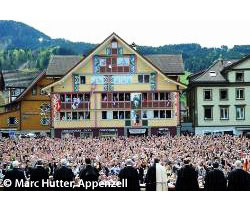
The key features of the Swiss Federal Constitution still exist and were established in 1848 against the pressure of neighbouring countries. It puts the people above all - the voters can not only choose their political representatives, but can also vote on all important business matters.
Additionally, it furnishes the cantons with extensive competencies: tax system, police, education and health care are regulated by the cantons.
The Constitution integrates small cantons, peripheral regions and linguistic minorities via a two-chamber parliament (National Council & Council of States) and a seven-member government into the responsibility of running the country.
Thus, the four largest parties have been represented in the government for several decades; a major opposition party does not exist. This so-called “concordance system” leads to compromise solutions after lengthy processes; this is conducive for the political stability of the country, but can negatively impact the pace and conciseness of the decisions.
... and self-will
Many Swiss have been shaped by the democratic participation rights and have an aversion to authority when they cannot influence it. This may be a reason for Switzerland being the only central European country which has not joined the European Union, although Switzerland has strong ties with foreign countries (e.g. more than 20% of the population consists of foreigners and 50% of the gross national product is generated abroad).
Already the old confederates had always fought against foreign laws and foreign judges, and despite all odds, we Swiss enjoy Switzerland’s special status as an idyllic island…
